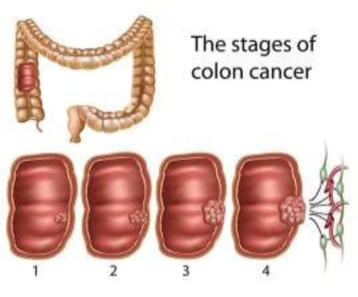Colon cancer is a type of cancer that starts in the large intestine- the lower part of the digestive system.
- 1 in 20 persons will be affected with colon cancer
- 60% of colon cancer deaths can be prevented
- Women and men aged 50 and over are most likely to develop this type of cancer; however, it can affect younger persons.
- Colon cancer usually begins as small noncancerous growths called polyps that form on the in- side of the large intestine.
SYMPTOMS
- Blood in stool
- Unexplained weight loss
- Persistent change in bowel habits that affects the shape, size and consistency of stool
- Prolonged fatigue and weakness
- The urge to pass stool shortly after doing so
STAGES OF COLON CANCER

WHAT INCREASES YOUR RISKS OF COLON CANCER?
- Being overweight or obese
- Being a smoker
- Consuming a diet high in pro- cessed food and red meat
- Being an alcoholic
- Having an inactive lifestyle
- Having a family history of colon cancer
- Being a person with diabetes
SCREENING FOR COLON CANCER
Screening for colon cancer can help detect the diseases at an early stage which makes the treatment process easier.
Stool Test
The FIT-DNA test–or stool DNA test–is a test which uses an entire bowel movement to check for cancer cells. It is done once every one or three years.
Colonoscopy
During a colonoscopy, a long, flexible tube with a tiny video camera at the tip allows the doctor to view the entire colon.
It can be done every 10 years. Recommendation will be made otherwise if the patient has a history of colon cancer.
PREVENTION
One of the best ways to lower your risk is to adapt a healthy lifestyle:
- Eat lots of fruits, vegetables and whole grains. A diet high in fiber helps to reduce the length of time food stays in the digestive tract before being excreted as waste.
- Limit or eliminate alcohol intake. Men should consume no more than 2 drinks per day (12 ounces); while, 1 drink (5 ounces) is recommended for women.
- Quit smoking.
- Engage in regular exercise. Physical activities lower your chances of being diagnosed. Aim to engage in at least 150 minutes of physical activity every week.
- Maintain a healthy weight as being overweight or obese increases your risk of colon cancer.
